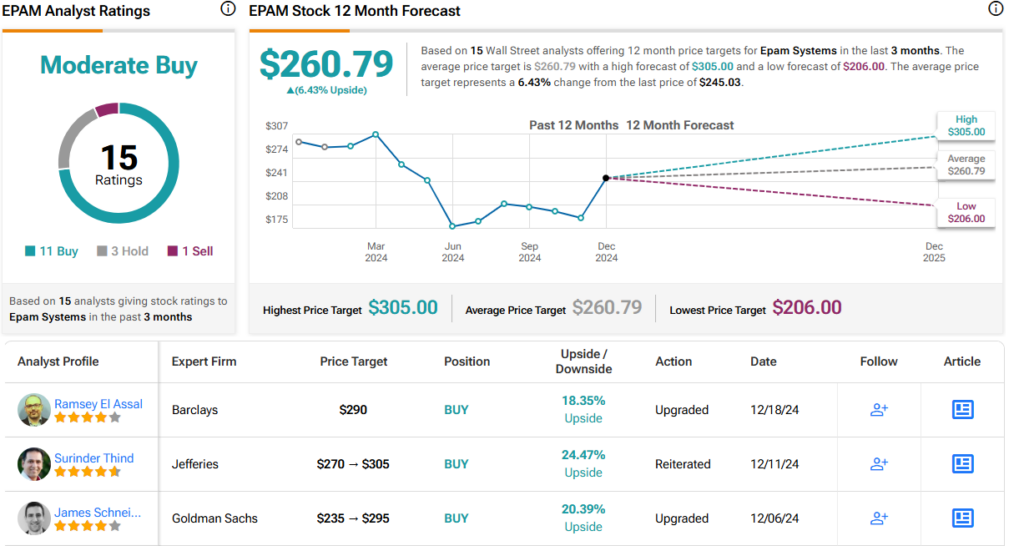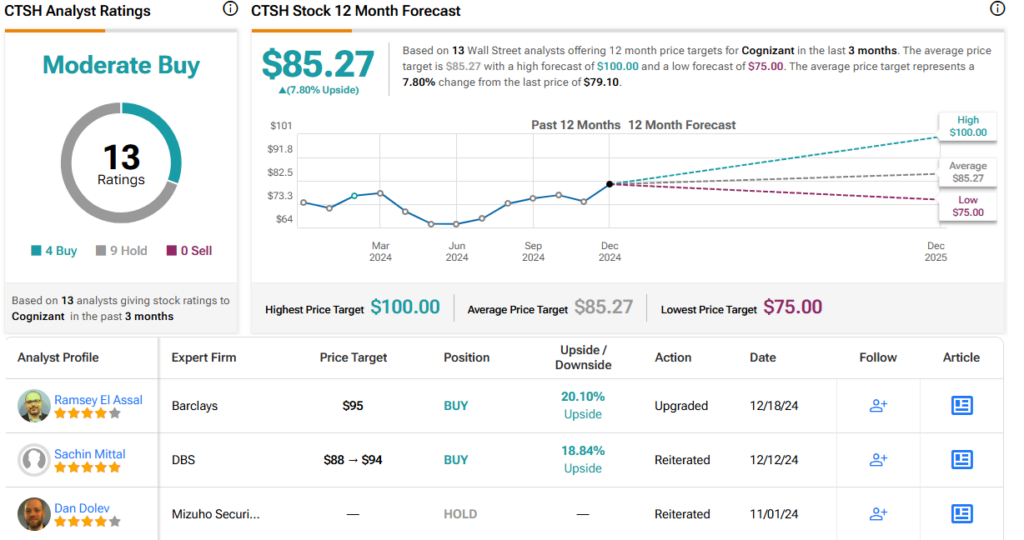Just in this century, we’ve seen a historic shift in the leading edge of the world’s economy, as it moved from a manufacturing/services base to a more digital/information configuration. The shift, which is analogous to the Industrial Revolution, has been uneven, in both its effects and its distribution, and even in the US, where it is arguably the most advanced, it is incomplete and ongoing. But the important point, for us, is that it has opened new opportunities for investors.
Confident Investing Starts Here:
- Quickly and easily unpack a company's performance with TipRanks' new KPI Data for smart investment decisions
- Receive undervalued, market resilient stocks straight to you inbox with TipRanks' Smart Value Newsletter
Those opportunities have hit some speedbumps in recent years, but now the digital horizon may be clearing somewhat. Ramsey El-Assal, the IT analyst from Barclays, has been watching recent developments in the digital world with deep interest and sees reasons for optimism.
“As we look ahead to FY25, we believe headwinds that have impacted the IT Services space over the past few years may start turning into tailwinds,” El-Assal opined. “Interest rates are coming down (albeit more gradually), inflation is easing, Generative AI projects are shifting from proof of concept to production, and the overall demand for digital transformation work looks to be perking up. In our view, these headwinds will turn to tailwinds, jump-starting a new investment cycle with a specific focus on becoming ‘Generative AI ready.’”
Following this thought, the Barclays analyst has picked out two IT stocks – and said that it’s time to pull the trigger and buy in. We’ve used the TipRanks platform to look up the broader Wall Street picture on both, to find out just what makes them compelling buys right now.
EPAM Systems (EPAM)
First up, EPAM Systems, an IT services provider that dates back to 1993 and today brings its software and digital expertise to bear on bridging the gap between the physical and digital sides of the business world. The company’s offerings include cloud services, cybersecurity, data analytics, engineering, and strategic planning. EPAM works with its clients to identify solutions to real-world digital problems and then aims to heal those pains, delivering answers and providing IT services at every scale, from small businesses to international enterprises.
EPAM’s client list includes some of the biggest names in the digital world, such as Adobe and AWS, Microsoft, and Google Cloud. The company operates in more than 55 countries and regions around the world, and in recent years has been developing expertise in both AI and cloud development.
The company’s AI services include generative AI development, from R&D through app delivery to building the technological infrastructure required to support a truly transformative AI environment. On the cloud side, EPAM’s services focus on infrastructure and security, as well as the reliability and automation needed to obtain the highest levels of efficiency from cloud computing.
Historically, EPAM drew much of its workforce from Ukraine, Belarus, and Russia—a geographical dependence that made the company vulnerable to disruptions caused by the current war in Eastern Europe. More recently, however, EPAM has been shifting its HR presence and drawing on talent from other regions, such as Latin America and Spain. The company’s headcount was 53,250 as of this past September 30.
On the financial side, EPAM generated $1.168 billion in 3Q24, the last quarter reported. That figure was up a modest 1.7% year-over-year and beat the forecast by $20 million. At the bottom line, EPAM realized a non-GAAP EPS of $3.12, up 39 cents per share from the year before and 42 cents per share better than had been expected.
For Barclays’ El-Assal, this company’s success in maintaining its capabilities in digital development while keeping up with its core work is a key factor, and he writes of EPAM, “We believe the company’s digital engineering DNA remains intact despite the geographical shift in headcount. Additionally, as spending shifts back toward digital transformation work and enterprises look to upgrade core systems, we believe digital pure-play providers like EPAM will benefit the most.”
Looking ahead, the analyst lays out some clear reasons why investors should be willing to invest in this firm: “As macro uncertainty is dissipating, we believe EPAM is in a better position to reaccelerate top-line growth, and while geopolitical conflicts remain an overhang, we believe EPAM has successfully shifted its headcount and will continue to deliver premium engineering work at pace.”
For the Barclays expert, this stance supports an Overweight (Buy) rating, and his price target, $290, implies that EPAM shares will gain 18% in the coming year. (To watch El-Assal’s track record, click here)
Overall, the stock’s Moderate Buy consensus rating is based on 15 recent analyst reviews that break down to 11 Buys, 3 Holds, and 1 Sell. The shares are trading for $245.03, and their $260.79 average price target suggests a one-year upside potential of 6.5%. (See EPAM stock forecast)

Cognizant Technology Solutions (CTSH)
The second stock we’ll look at today is Cognizant Technology, a $39 billion giant of the IT industry. The company operates mainly in North America, although about one-fifth of its business comes from Europe. Cognizant focuses on reengineering its clients’ businesses, bringing them into line with the demands and needs of the modern digital economy. Cognizant’s services include cybersecurity, cloud computing, software development, IoT – and AI for use in workflow automation and database management. The company employs more than 340,000 people worldwide, and generated $19.4 billion in total revenue last year.
Cognizant’s own business operates in several segments, including communications, media, and technology; products and resources; health sciences; and financial services. The latter two are the largest of the company’s segments, accounting for $3 billion in revenue between them in the last reported quarter, 3Q24. The company claims that its customer base includes 30 of the world’s top pharmaceutical firms, 9 of the top 10 medical companies, and 9 of Europe’s top 10 banks.
The company’s 3Q24 report, in addition to showing sound results in the largest business segments, also showed moderate year-over-year gains at the top and bottom lines. The company’s quarterly revenue came to $5 billion, up 3% from the prior year, $50 million better than had been expected; the non-GAAP EPS, of $1.25 per share, was up from $1.16 in 3Q23 and was 10 cents better than the forecast.
El-Assal, in his coverage for Barclays, outlines his belief that Cognizant has recovered from pandemic-era difficulties and is on track toward stronger growth going forward. He writes, “While CTSH underperformed peers during the pandemic, we believe management has successfully pivoted the business, and as demand returns, we expect to see the company win new work. With the reshaping of the delivery pyramid, CTSH has been able to return to industry-average attrition rates and rebuild a digital-focused identity. Additionally, with a mix of organic and inorganic investments, CTSH is enhancing its value proposition with vertical focused-domain expertise supplemented by horizontal capabilities, in our view. This paired with an improving demand environment throughout FY25 and into FY26 will likely drive a reacceleration in top-line growth.”
El-Assal’s comments back up his Overweight (Buy) rating, and his $95 price target implies a 12-month upside potential of 20%.
The stock’s Moderate Buy consensus rating is based on 13 Wall Street reviews, including 4 Buys and 9 Holds. The shares are priced at $79.10 and their $85.27 average price target points toward an 8% gain in the coming year. (See CTSH stock forecast)

To find good ideas for stocks trading at attractive valuations, visit TipRanks’ Best Stocks to Buy, a tool that unites all of TipRanks’ equity insights.
Disclaimer: The opinions expressed in this article are solely those of the featured analysts. The content is intended to be used for informational purposes only. It is very important to do your own analysis before making any investment.










